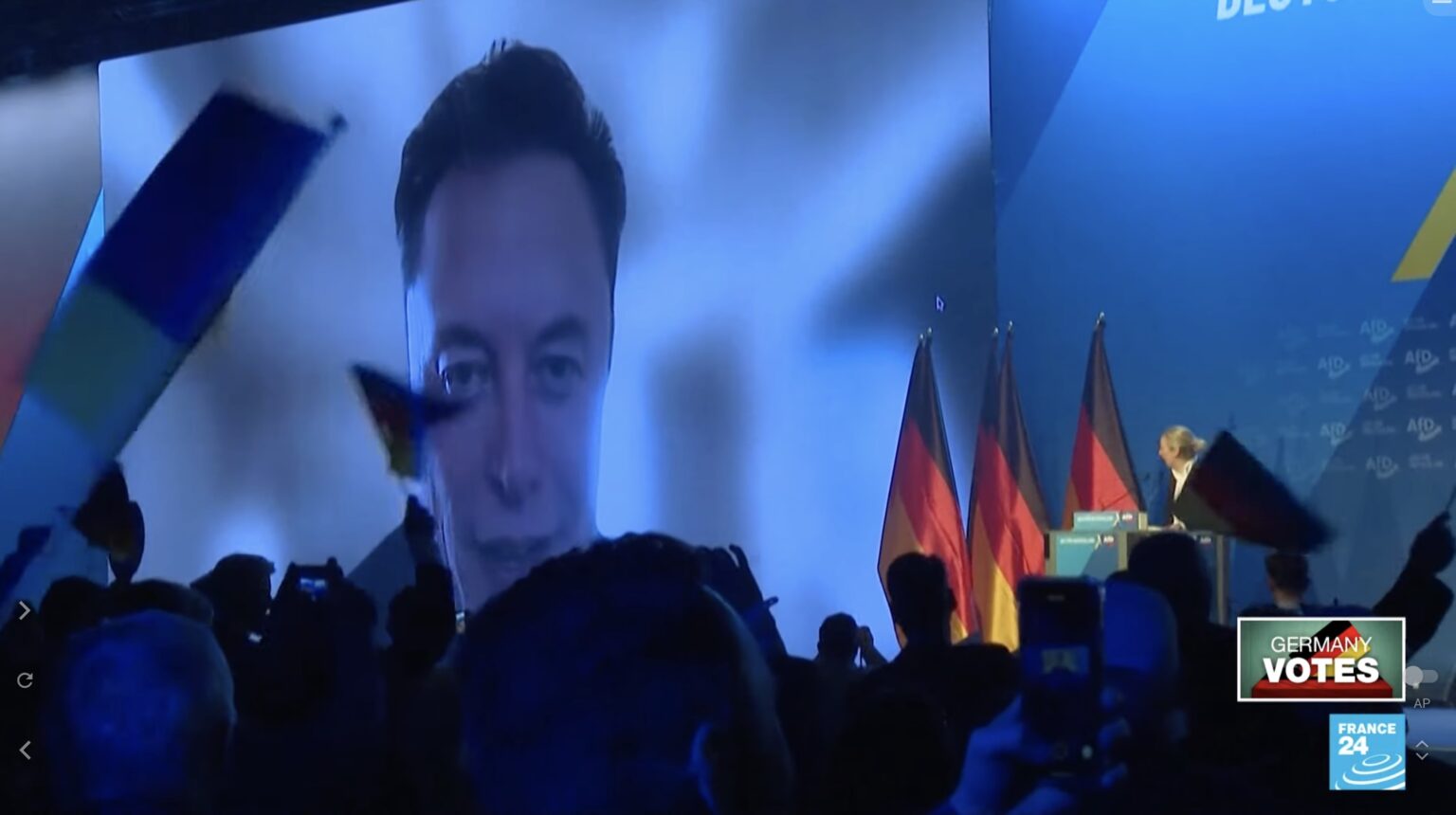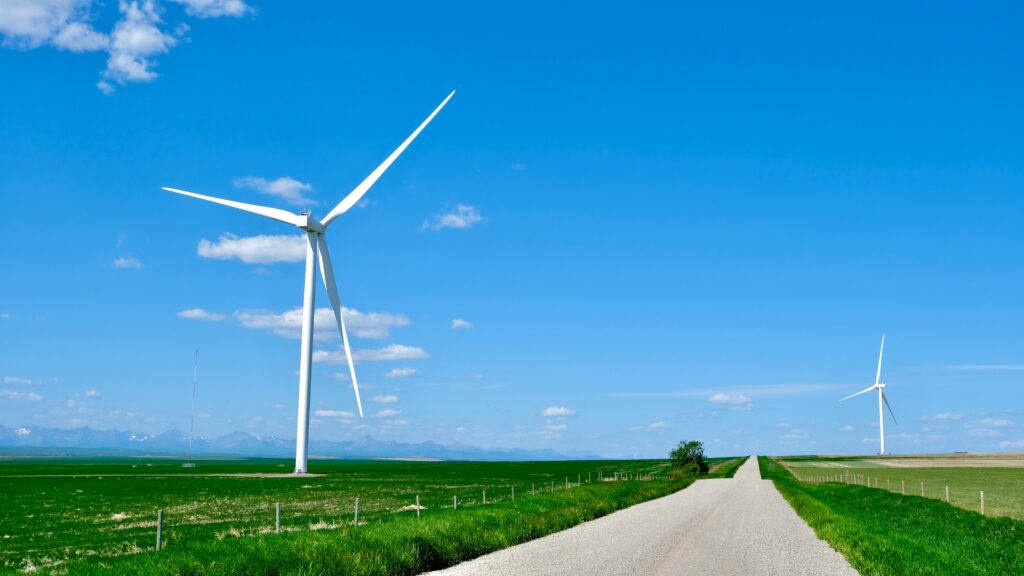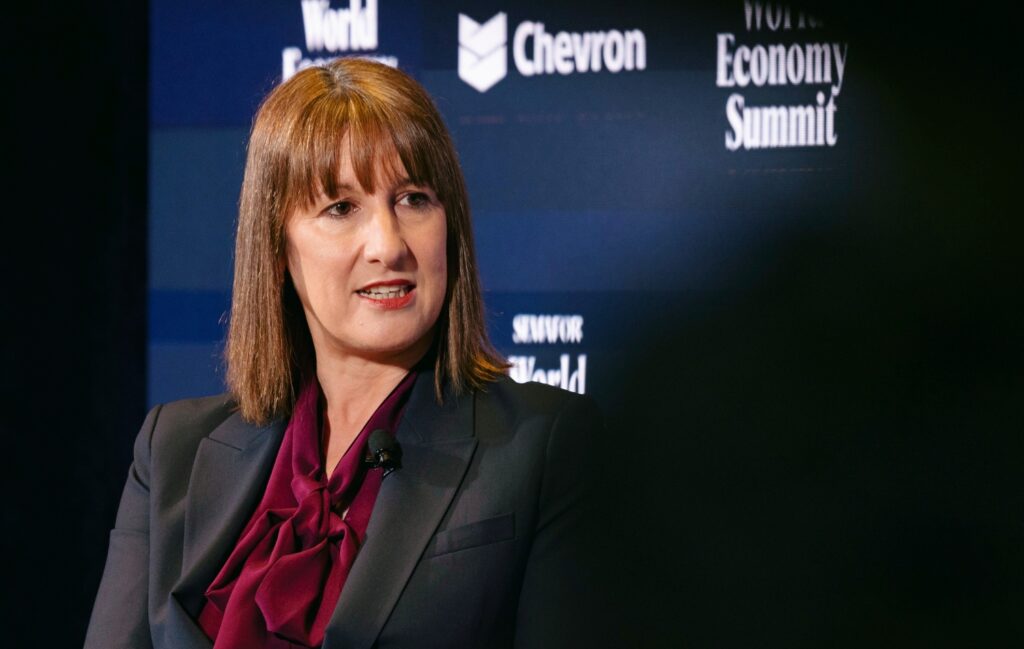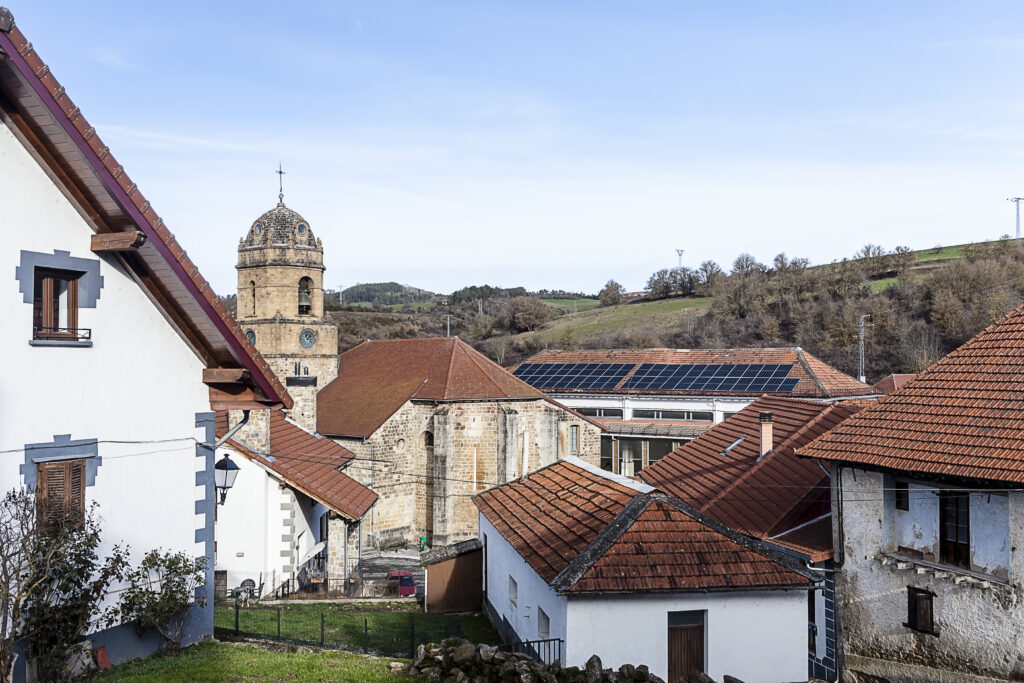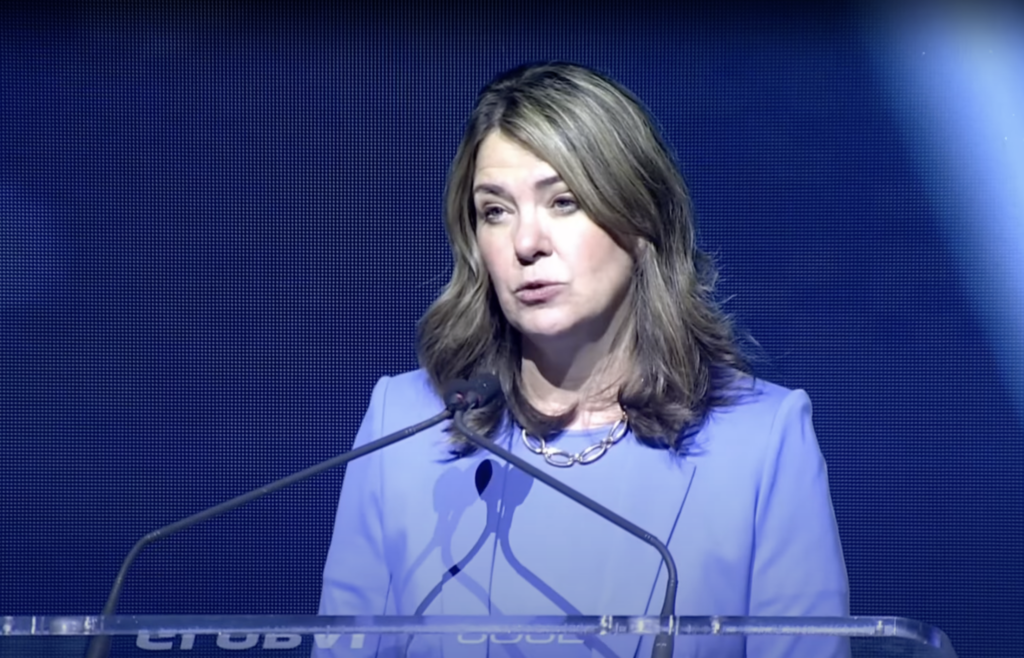In December, a Chicago-based organization called the Heartland Institute, which for decades has attempted to undermine the scientific consensus on climate change, devoted an episode of its daily podcast to Elon Musk.
As recently as 2022, Heartland figures had ridiculed the Tesla CEO as a member of the “billionaire climate elite” based on Musk’s claim that as a top manufacturer of electric vehicles, his company was “doing the most to solve climate change.”
But perhaps, the podcast guests speculated, Musk was finally “abandoning the climate cult.”
The episode was recorded after Musk had given upwards of $277 million to get Donald Trump elected president, argued that “we don’t need to rush” on addressing climate change, and vowed to cut $2 trillion of federal government spending. One guest on the show was cautiously optimistic, saying: “I’m coming around on Musk.”
Heartland, which didn’t respond to a request for comment, isn’t the only anti-climate group embracing Musk these days.
DeSmog journalists in the European Union, the UK and the United States reviewed public materials from prominent climate deniers referencing Musk over recent months. Taken as a whole, these podcasts, opinion pieces, social media posts, newsletters, YouTube videos, and interviews with legacy media reveal an unmistakable trend: Musk’s public embrace of right-wing populists is invigorating a transatlantic movement aiming to spread doubt about the reality of climate change and sabotage action on the crisis.
His interventions ahead of Germany’s elections on Sunday have energized the far-right Alternative for Germany, or AfD, which says that climate policy “threatens our freedom,” a January poll suggests.
His courtship, along with Trump, of hardline leaders in Europe threatens to torpedo hopes of progressive climate action by the EU, think tanks warn.
And in the U.S., Musk’s ongoing war against the federal bureaucracy “erodes our collective ability to adapt to climate impacts,” Amanda Fencl, director of climate science for the nonprofit Union of Concerned Scientists, has warned.
Some longtime climate deniers are thrilled, however, recognising that even a brief endorsement from Musk to his 217.9 million followers on X — the social media platform formerly called Twitter, which he bought in 2022 — can confer instant visibility and excitement.
“We welcome Elon Musk into the climate red pill group,” Climate Depot executive director Marc Morano stated in December, using a phrase popular among Trump supporters that refers to rejecting liberal viewpoints.
Musk, contacted via Tesla, did not respond to a detailed list of questions about his shifting climate views.
‘Windmills of Shame’
When Germans vote for a new government on Sunday, the EU’s most populous country is widely predicted to shift to the right. Leading the polls at about 29 percent of voters is the centre-right Christian Democratic Union, or CDU, which intends to prioritise economic growth over accelerated climate measures endorsed by the ruling Greens and Social Democrats, or SPD.
Less certain is the influence that the surging far-right AfD will have on the next German government. On X, Musk has openly endorsed and platformed the party, which wants to ditch Germany’s climate commitments.
As migration and economic stagnation dominate German politics, the AfD is now polling close to 21 percent — potentially doubling the 10 percent of votes it won in the last national elections in 2021. The party states that the level of human contribution to global warming is “not scientifically proven,” and opposes state support for renewable energy and electrification of heat and transport, while advocating for Germany’s gas and coal power sectors.
The CDU says that it will not form a coalition government involving the AfD, and maintains its commitment to Germany’s 2045 net-zero emissions target. But despite its opposition status, the AfD is already shaping national political discourse — and even decision-making.
While the CDU and Germany’s other mainstream parties have traditionally refused to vote with the AfD due to its extreme stances on immigration and Germany’s Nazi past, the CDU broke this so-called “firewall” last month by voting with the AfD on a resolution to restrict migration.
Musk has sided with the AfD on its hard-line immigration stance and nationalist messaging. In December, Musk openly endorsed the party, shocking liberal Germans by writing on X that “only AfD can save Germany.” He went on to join a 9 January livestream with the AfD co-leader Alice Weidel, who has attracted controversy for Islamaphobic remarks, such as in a 2018 Bundestag speech when she said “burqas, headscarf girls, publicly-supported knifemen, and other ‘good-for-nothings’ will not secure our prosperity, economic growth, and the social state.”
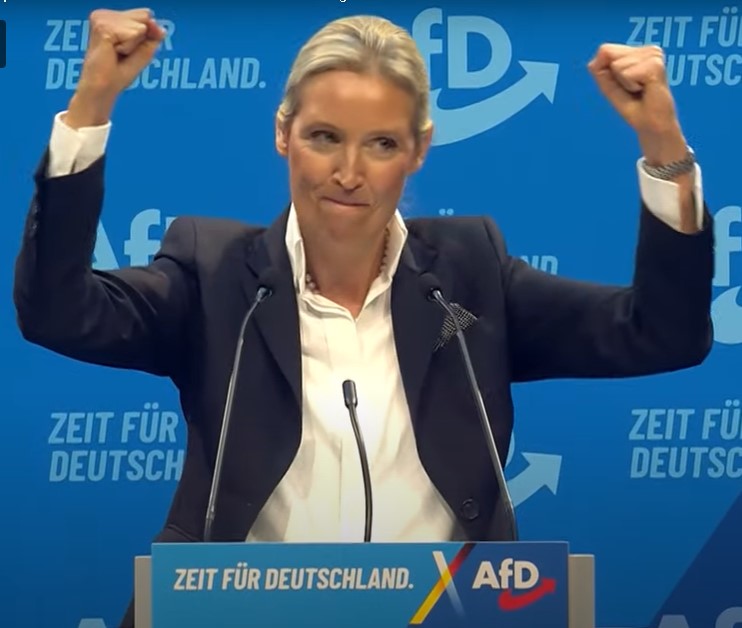
In terms of climate policy, Weidel has suggested that if the AfD takes power in Germany, it could dismantle wind turbines, recently calling them “windmills of shame.” The wind sector produced a third of the country’s electricity last year.
During their conversation, both Musk and Weidel expressed support for nuclear power — with Musk also saying he was a “big fan” of solar energy — and Weidel stating that Germany’s CO2 footprint was “obnoxiously very very high.” Both steered clear of the AfD’s official climate-denialist party platform.
Then, less than two weeks later, Musk sparked a global furore by raising his arm to the crowd at Trump’s January 20 inauguration in a gesture that many likened to a Nazi salute. The Amadeu Antonio Stiftung, a German organisation which advocates against right-wing extremism and anti-Semitism, saw no ambivalence in Musk’s move, describing it as a “Hitler salute.” Musk responded to the outpouring of criticism by posting on X: “The ‘everyone is Hitler’ attack is sooo tired.”
Five days after Trump was sworn-in, Musk ramped up his support for the AfD by addressing a party rally via videolink. He urged supporters to “take pride” in being German over “some sort of multiculturalism that dilutes everything”, and told them that there’s “too much of a focus on past guilt” — remarks condemned by Polish prime minister Donald Tusk.
YouTube Influencer
Musk had previously enjoyed support from Germany’s centrist parties. When Tesla opened a multi-billion dollar electric car factory in the State of Brandenburg in 2022, the move was billed as a boost to both the country’s manufacturing sector and climate credentials. But during his January livestream with Weidel, Musk expressed his disdain for the bureaucratic procedures needed to build the Tesla factory, which he said amounted to “25,000 pages”.
Musk’s public support for the AfD can be traced back to his interactions with Naomi Seibt, a 24-year-old German influencer who built a sizeable social media following attacking “climate alarmism” and cultivating a brand as the anti-green doppelganger of Swedish climate activist Greta Thunberg. Her rise to prominence was aided by the Heartland Institute, which featured her in a YouTube video it published in February 2020. Seibt has since told Reuters that the organisation had paid her $4,000 a month for three months as a “scholarship.” (Seibt no longer appears to be affiliated with the group).

When Seibt posted on X last June that she’d voted for the AfD in the EU elections, which saw the formerly fringe party rise to 16 percent of the total vote — its best-ever result — Musk began sending her private messages asking for more information, according to Seibt. “And then he started following me,” Seibt told the BBC, noting that “it took him many months to decide to support the AfD.”
Musk’s backing could boost a party that’s heavily critical of the country’s decarbonization efforts. A January poll of German voters from the U.S.-based Democracy Institute think tank suggested that 28 percent of respondents say they are “more likely” to vote AfD due to Musk’s support, while 23 percent said it made their support “less likely.”
Germany’s center-right and center-left leadership have condemned Musks’s interventions. Friedrich Merz, head of the CDU, told The Wall Street Journal last week that Musk would face consequences for boosting the AfD. Chancellor Olaf Scholz, a member of the centre-left SPD, last month called Musk’s support for European far-right parties “disgusting.”
The new Trump administration is already mirroring the billionaire’s embrace of the AfD. Last week, U.S. Vice-President JD Vance met with Weidel, the AfD co-chief, on the sidelines of a security conference in Munich, while snubbing Scholz.
With the U.S. playing a major role in German trade and security, this budding transatlantic alliance could bode poorly for climate action in Europe’s biggest economy.
Neither Seibt nor the AfD responded to questions.
Courting the European Far-Right
Musk’s electrifying impact on the AfD builds on his years of dabbling in far-right politics in other European countries.
In December 2023, Musk appeared as a guest of honour at an annual convention in Rome hosted by the Brothers of Italy, the right-wing populist party of Italian Prime Minister Giorgia Meloni, who had said earlier that year that “ultra-ecological fanaticism” was an economic threat.
Santiago Abascal, leader of Spain’s far-right Vox party, also attended the 2023 convention. He had recently predicted that Spanish citizens would hang their current Socialist Prime Minister, Pedro Sánchez, by his feet, remarks that were so controversial that some Brothers of Italy members asked for his invitation to be withdrawn, the Spanish newspaper El País reported.
But whereas Abascal’s presence threatened to create divisions at the event, “Elon Musk’s case is somewhat different, arousing only enthusiasm and selfie fervor,” noted El País. “The tycoon is nowadays the darling of almost all those on the ultra-right who seek media and economic backing, and a cutting-edge image.”
A month later, in January 2024, Musk again signalled his interest in European politics.
With German farmers protesting the end of government diesel fuel subsidies and a new tax on agricultural vehicles, Anthony Lee, who had stood for the European Parliament as a candidate for Free Voters, a German conservative populist party, gave an interview to right-wing Dutch influencer Eva Vlaardingerbroek. Lee told Vlaardingerbroek that politicians “want our land to build industry, houses. Houses for refugees, whoever, I don’t care what for.”
After Musk reacted to the video on X, writing “Support the farmers!” Lee said in a video message that “I think it’s just awesome that Elon Musk himself tweeted this…This is only possible because we stand together.” The video was viewed over 200,000 times. Lee did not respond to a request for comment.
A year later, Musk was rubbing shoulders at Trump’s inauguration with a who’s-who of right-wing European politicians, including Spain’s Abascal, France’s Éric Zemmour and Reform UK leader Nigel Farage, all of whom have questioned the science and urgency of climate change.
Analysts with the independent European Policy Center think tank in Brussels sees the inauguration guestlist as a worrying sign that Trump and Musk are helping strengthen “ideological ties between significant radical forces on both sides of the Atlantic.” They are concerned about the impact a second Trump administration may have on a host of EU-wide initiatives, including a raft of climate reforms known as the European Green Deal.
“The most concerning possibility,” the analysts argue, is “Trump’s probable exploitation of far-right leaders or governments to block EU policies or advance his agenda.”
Musk’s Shift to ‘Climate Skeptic’
For years, Musk enjoyed a reputation as a crusading green energy entrepreneur on a mission to render the internal combustion engine obsolete, celebrated by climate activists and cleantech investors alike — despite growing signs of his right-ward political leanings. As recently as last August, the online news outlet E&E News ran a story speculating that “Musk might be the only person Trump listens to on climate.”
But Musk’s politics and business interests seemed to decisively converge during a 2024 meeting of Tesla executives in Palo Alto, California, where he shelved plans to develop a more budget-friendly compact car that could be marketed to lower-income customers around the world, according to a report in the Washington Post. This had previously been a key part of Tesla’s plan to “accelerate the world’s transition to sustainable energy.”
Instead, Musk approved a plan worth billions of dollars to purchase computer chips that could improve Tesla’s luxury vehicles, the Washington Post report said. Musk had shifted from calling for “a popular uprising” against the fossil fuel industry in 2016 to stating that there were more important global problems to address.
In a livestream with Trump last year, Musk stated that “we don’t need to rush” in fixing climate change.
This also happens to be the message of Bjørn Lomborg, a longtime Danish climate crisis denier (and apparent “friend” of Trump administration energy secretary Chris Wright) whose 2023 book Best Things First argued that there were more important global priorities to address than climate change. According to a recent edition of Lomborg’s newsletter, the Canadian conservative influencer Jordan Peterson shared a copy of Lomborg’s book with Musk in 2024.
Within U.S. denial networks, some leaders link Musk’s shift to the flourishing of anti-climate messages on Twitter after the billionaire purchased the platform, and renamed it X. “I mean, there are thousands, if not hundreds of thousands of climate skeptics on X/Twitter, and they’re constantly posting content that we put out here,” the Heartland Institute’s Anthony Watts argued on the group’s podcast. “Musk has had to have seen some of this stuff.”
Musk’s former critics in climate denial circles now see him as the best bet for implementing their most extreme ideas. Musk’s so-called Department of Government Efficiency has been attempting to shut down key climate-related agencies like the United States Agency for International Development, or USAID.
On the website of the conservative group CFACT, prominent denier Paul Dreissen — who previously accused Musk of holding “sanctimonious” views on “the alleged climate crisis” — has offered policy suggestions to the billionaire as he wages war on the federal bureaucracy: End subsidies for renewable energy; terminate funding for environmental and climate justice programs; and require applicants for climate research funding to “provide computer codes and analyses so that reviewers can view and evaluate their work.”
Parts of Musk’s plan seem to rely on two recent, pro-industry Supreme Court decisions to unwind regulatory authority long held by federal agencies — an overarching goal of the Heritage Foundation’s Project 2025 initiative, retooled with Musk’s Silicon Valley spin.
If successful, these cuts will dismantle decades of clean air and water protections, and hamstring the country’s ability to respond proactively to the worsening climate crisis, said Fencl, the director of climate science at the Union of Concerned Scientists.
“Our infrastructure systems are not going to withstand the climate impacts we’re expecting, and taking away the government’s spending in these spaces really erodes our collective ability to adapt to climate impacts,” Fencl said.
Raising the UK’s Political Temperature
Since throwing his fortune and social media influence behind Trump, Musk has teased the possibility of attempting a similar campaign in the UK.
In December, Musk met with Reform UK leader Farage, who also co-founded and formerly led the Brexit Party, at Trump’s Mar-a-Lago resort in Florida.
The two were in talks about Musk offering a £100 million (over $125 million) donation to Reform, The Times of London reported. Farage has said he finds it “extraordinary that people call carbon dioxide a pollutant, and Reform UK’s latest party manifesto recycles a long-debunked claim that “scientists disagree as to how much” human activity is causing climate change. So such a donation would have been a major investment by Musk in transatlantic climate denial.
Then, in January, Musk used X to call for the release of Tommy Robinson, a far-right British influencer serving an 18-month contempt of court sentence for making false accusations about a Syrian schoolboy. When Farage rejected his calls to join forces with Robinson, Musk tweeted that, “the Reform Party needs a new leader. Farage doesn’t have what it takes.”
Farage was not sufficiently swayed by Musk’s comments to support Robinson’s return, although he struck a conciliatory note by saying the tech mogul didn’t know “the full story” about the provocateur’s criminal past. By the end of January, Farage was signalling to the press that his rift with Musk was over, telling The New York Times that the billionaire was still open to donating to Reform UK. “We’ve got very similar goals on some areas, slightly different emphases in others,” Farage said, adding that Musk was sharing valuable information about how Trump won over swing voters during the U.S. election.
Farage is also collaborating with the Heartland Institute, which has claimed credit for working with hard-right parties in Austria and Hungary to attempt to stall the EU’s Nature Restoration Law, which sets targets for restoring damaged ecosystems, as well as other green policies. Farage helped launch the pro-Trump institute’s new UK-Europe branch in December.
Farage’s newly formed Reform UK won just five of the 650 seats in the lower house of parliament in last year’s elections, and was unsuccessful in generating a backlash against the country’s net-zero emissions goal. Nevertheless, the party appears to be pushing the historically weakened Tories to the right on climate change — echoing Farage’s previous strategy to rally support for the 2016 Brexit referendum.
Regardless of how much tangible backing Musk might provide to right-wing figures in the UK, his winning bet on Trump, and assault on federal government spending, has inspired Farage and his allies with a sense of the possible. “There’s a heck of a lot we’ve learned from that we will implement over the next few years,” Farage told The New York Times.
Some European leaders are looking for ways to neutralize Musk’s efforts to sway voters.
In January, as Musk posted false allegations that UK Prime Minister Kier Starmer had let child sex abusers escape justice, France called on the European Commission to take action against Musk and X for election interference. According to The Financial Times, Musk was also investigating how to get Starmer out of office before the country’s next election, and replace his center-left government with right-wingers.
Members of the European Parliament, who are elected representatives of their respective nations, are also criticizing the Commission for failing to use its authority under the EU’s Digital Services Act to investigate and fine Musk and X, as well as other major social media platforms, for spreading disinformation.
Asked about Musk’s tirade during a public event in January, Starmer did not name the billionaire directly in his response. “Those that are spreading lies and misinformation as far and as wide as possible, they’re not interested in victims,” said Starmer. “They’re interested in themselves.”
Additional reporting by Emily Gertz
Subscribe to our newsletter
Stay up to date with DeSmog news and alerts


